Suchergebnisse für "Factsheet: Energietechnologien gestalten, die für alle sinnvoll und nutzbar sind"
ReSpace – Reclaiming Spaces
ReSpace entwickelt ein KI-gestütztes Modell zur Identifikation, Kategorisierung und Aktivierung versiegelter Flächen. Dabei werden bestehende Datenquellen (Luft- und Satellitenbilder, Mobilfunkdaten, Grundbucheinträge) integriert und mit einer dynamischen Analyse angereichert, um evidenzbasierte Handlungsempfehlungen abzuleiten.
Hocheffiziente Kombinationen von Solarthermie, Photovoltaik und Wärmepumpenanlagen (Sol2Pump)
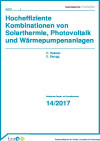
Schriftenreihe
14/2017
D. Reiterer, E. Sarugg
Herausgeber: BMVIT
Deutsch, 127 Seiten
Downloads zur Publikation
DW² - Entwicklung einer thermisch verbesserten Schlitzwandkonstruktion
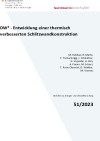
Die thermischen Eigenschaften von Schlitzwandkonstruktionen werden durch die Anwendung neuer Materialien und Herstellungsmethoden verbessert und durch Labor- und Feldversuche validiert sowie durch numerische und ökologische Betrachtungen ergänzt. Das Ergebnis kann bei der Errichtung von energetisch verbesserten unterirdischen Bauwerken wie beispielsweise Tiefgaragen oder zur Herstellung von Erdwärmespeichern verwendet werden.
Schriftenreihe
51/2023
M. Rebhan, R. Marte, F. Tschuchnigg, J. Schleicher, G. Vojvodic, H. Kim, A. Passer, M. Scherz, T. Potrc Obrecht, G. Winkler, M. Vremec
Herausgeber: BMK
Deutsch, 55 Seiten
Downloads zur Publikation
OptiMAS - Optimierung der Gebäudeenergieeffizienz durch modellbasierte Energiestromanalyse mit non-invasiver Sensorik
OptiMAS untersuchte, wie durch eine modellbasierte Energiestromanalyse und unter Verwendung von Anlegesensorik bestehende Gebäude überwacht, analysiert und optimiert werden können, unabhängig von den darin verwendeten HLK-Systemen und deren Automationskomponenten. Mit dem OptiMAS Ansatz kann das Optimierungspotential von Einzelgebäuden bis hin zu ganzen Arealen und Stadtteilen erfasst, lokalisiert und durch Anpassung von Systemparametern höchstmögliche Energie- und Ressourceneffizienz sichergestellt werden.
Solare Kühlmaschine mit einer Leistung von 2 kW

Entwickung und Bau des Prototyps einer Kühlmaschine mit einer Kühlleistung von ca. 2 kW, Test und Optimierung am Prüfstand, Anschluß an eine Solaranlage und Verwendung zur Raumkühlung
Entwicklung von thermischen Solarsystemen mit unproblematischem Stagnationsverhalten
Untersuchungen zum Einfluss von Kollektorverschaltung, Rohrführung und Armaturenanordnung auf das Stagnationsverhalten von thermischen Solarsystemen.
E.Vent – Efficient, cost-effective and low-maintenance central ventilation systems for multi-family housing – Design, operation and fire protection measures
Die Synopsis ist eine drei- bis vierzeilige Beschreibung des Projektinhalts alsErgänzung zum Titel und nähere Erläuterung des Projekts.
SPIDER - Subtraction as a measure to Preserve and Insulate historic Developments by Electric Robots
In dieser Sondierung soll das Potential von autonomen, daten-getriebenen Robotern erschlossen werden, die in einem andauernden kontinuierlichen Prozess thermische Performanceverbesserungen durch Schaffung von dämmenden Lufteinschlüssen erzielen.
Scanning and data capturing for Integrated Resources and Energy Assessment using Building Information Modelling (SCI_BIM)
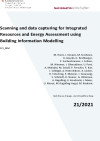
Ziel dieses Projekts ist, durch Kopplung unterschiedlicher digitaler Technologien und Methoden zur Datenerfassung- (Geometrie und materielle Zusammensetzung) und Modellierung (as-built BIM) die Steigerung der Ressourcen- und Energieeffizienz mittels Gamification Ansatz zu ermöglichen.
Schriftenreihe
21/2021
M. Honic, I. Kovacic, M. Sreckovic, G. Gourlis, H. Rechberger, P. Aschenbrenner, J. Fellner, M. Wimmer, I. Gilmutdinov, U. Pont, A. Mahdavi, M. Schuß, P. Ferschin, P. Kan, I. Schlögel, A. Hinterleitner, K. Löcker, R. Totschnig, P. Meixner, I. Greussnig, S. Schmidt, H. Steiner, G. Uhlariova, A. Ragoßnig, K. Kondracki, J. Maier, U. Moroz, M. Ragoßnig-Angst, M. Raskovic
Herausgeber: BMK
Deutsch, 62 Seiten
Downloads zur Publikation
Walchfenster04 - vom Funktionsmuster zum seriennahen Prototyp
Ausarbeitung des Funktionsmusters des Fenster- und Fassadensystemes walchfenster04 zu einem seriennah produzierbaren Prototyp inkl. Entwicklung der benötigten neuen Produktionsprozesse und -technologien.
ThinkHome: Gesteigerte Energieeffizienz durch den Einsatz von künstlicher Intelligenz im Haus der Zukunft
ThinkHome ist ein vernetztes, autonom gesteuertes Haus der Zukunft, das der Optimierung der Energieeffizienz und der Verbesserung des Nutzerkomforts dient. Das intelligente Zusammenspiel aller Haustechnikkomponenten ist hierbei von höchster Bedeutung. Zu den Projektinhalten zählten eine umfassende Wissenspräsentation aller in einem Gebäude vorkommenden Daten, der Einsatz von Methoden der künstlichen Intelligenz, maschinelles Lernen sowie agentenbasiertes Software Engineering.
solSPONGEhigh - Hohe solare Deckungsgrade durch thermisch aktivierte Bauteile im urbanen Umfeld
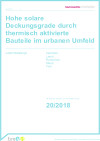
Im Forschungsprojekt solSPONGEhigh wurde die intensive Nutzung von thermisch aktivierten Bauteilen (TABs) als zusätzlicher thermischer Speicher in verschiedenen Gebäuden unter vorrangigem Einsatz von Solartechnologien untersucht. Die Arbeitshypothese ging davon aus, dass durch die Aktivierung und Nutzung der bauteilimmanenten thermischen Speicher eine Deckung des Gebäudeenergiebedarfs mit Solartechnologien von bis zu 100 % erreicht werden könnte.
Schriftenreihe
20/2018
Heimrath, Lerch, Ramschak, Mach, Fink
Herausgeber: BMVIT
Deutsch, 112 Seiten
Downloads zur Publikation
Plug&Play Storage of Photovoltaic Power (P3Power)
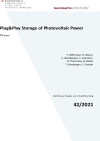
Im Projekt P³Power wird die Messtechnologie NetDetection (Abschätzung des Leistungsverbrauchs an einer Phase von einem beliebigen Messpunkt, z.B. einer Steckdose, in einem Haushalt) entwickelt. Auf Basis dieser Technologie werden plug&play Photovoltaik- und Speichersysteme realisiert, welche 100% Eigennutzung innerhalb beliebiger Aggregationsgrößen - vom Mehrfamilienhaus bis zur Gemeinde - ermöglichen ohne bestehende Installationen adaptieren zu müssen. Die Technologie wird digitalisiert, im Laborumfeld und in Realhaushalten getestet und zu einem umfassenden Energie-Service-Angebot weiterentwickelt.
Schriftenreihe
42/2021
Y. Wittmann, H. Bieser, S. Weinberger, C. Grimmer, B. Thormann, B. Böckl, T. Kienberger, V. Hacker
Herausgeber: BMK
Deutsch, 48 Seiten
Downloads zur Publikation
Optimierung des Bewitterungsverhaltens von bindemittelfreien Zellulose-Compounds

Optimierung des Bewitterungsverhaltens (UV-Schutz und Wasserfestigkeit) von bindemittelfreien Zellulose-Compounds (inkl. Lebenszyklusoptimierung)
greening UP! Nachhaltige Grünpflege, Wartung, Instandhaltung von Vertikalbegrünungen inklusive rechtlicher Aspekte
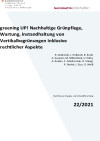
Im Projekt wurden aufbauend auf umfassenden Erhebungen und Analysen von bestehenden vertikalen Gebäudebegrünungen in Außenräumen (boden- und systemgebundene Fassadenbegrünungen) und vertikalen Innenraumbegrünungen passgenaue Grünpflege-, Wartungs- und Instandhaltungskonzepte erarbeitet und rechtliche Aspekte adressiert. Der "greening UP!"-Wissenspool mit konkreten Empfehlungen und anschaulich aufbereitetem Wissen sowie die Konzeption eines digitalen Tools zur "Ersten Grünen Hilfe" runden das Projekt ab.
Schriftenreihe
22/2021
R. Dopheide, J. Hollands, B. Knoll, A. Korjenic, M. Mitterböck, U. Pitha, A. Renkin, F. Schiefermair, R. Stangl, P. Skolek, I. Süss, O. Weiß
Herausgeber: BMK
Deutsch, 162 Seiten
Downloads zur Publikation
FM.Comfort/FM.Ware - Software zur optimalen Ressourcennutzung im virtuellen Haus
Das Softwareexpertensystem FM.Comfort/FM.Ware realisiert das virtuelle Haus (vh). Das virtuelle Haus ist das parametrierbare Computermodell eines realen Gebäudes. Dieses Modell dient zur Optimierung der Energie- und Ressourcennutzung über Analyse der Lebens- und Arbeitsgewohnheiten und zur positiven Beeinflussung des Nutzerverhaltens bzw. zur Nutzermotivation.
Hausenergiezentrale mit Umweltenergie
Diese Hausenergiezentrale vereint Heizung, kontrollierte Wohnraumlüftung und Warmwasserversorgung auf Basis von Wärmepumpen in einem Gerät Dieses Projekt wurde nicht im Rahmen der Programmlinie "Haus der Zukunft" finanziert, leistet aber sehr wohl einen wichtigen Beitrag zur nachhaltigen Entwicklung.
Potenzial der ökologischen Optimierung technischer Gebäudeausrüstung durch den Einsatz biogener Materialien (BiBi-TGA)
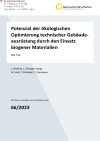
Erhebung des Substitutionspotenzials herkömmlicher Komponenten der technischen Gebäudeausrüstung durch biogene Materialien. Ziel war die Generierung neuer Daten zum ökologischen Verbesserungspotenzial des Einsatzes biogener Ressourcen in der technischen Gebäudeausrüstung in Bürogebäuden. Anhand von LCA-Screenings und Untersuchungen der technischen Umsetzbarkeit wurden die Potenziale analysiert.
Schriftenreihe
66/2023
J. Weithas, L. Eitzinger-Lange, M. Leeb, T.Schnabel, F. Coosmann
Herausgeber: BMK
Deutsch, 60 Seiten
Downloads zur Publikation
BIM2BEM Flow - Kontinuierliche, BIM-basierte Energieeffizienzplanung
Durch eine automatisierte Integrierung und Zuweisung der Austauschanforderungen zwischen Entwurfs- und Simulationsprogramm anhand der ausgearbeiteten Austauschinformationsanforderungen, soll eine kontinuierliche Energieeffizienzplanung entlang der Entwurfsphase ermöglicht werden.
"Gasthermenersatz" - Modular aufgebaute Wärmepumpe mit umweltfreundlichem Kältemittel als Gasthermenersatz im großvolumigen Wohnbau
Das Projekt "Gasthermenersatz" zielt darauf ab, ein Funktionsmuster einer dezentralen, schalloptimierten Wärmepumpenlösung mit seriell- oder parallel verschalteten Kältekreis-Modulen zu entwickeln, zu bauen und zu testen. Diese erneuerbare Technologie ist besonders geeignet, um bestehende Gasthermen im großvolumigen Wohnbau zu ersetzen, und damit den Weg zur klimaneutralen Stadt zu ebnen.
